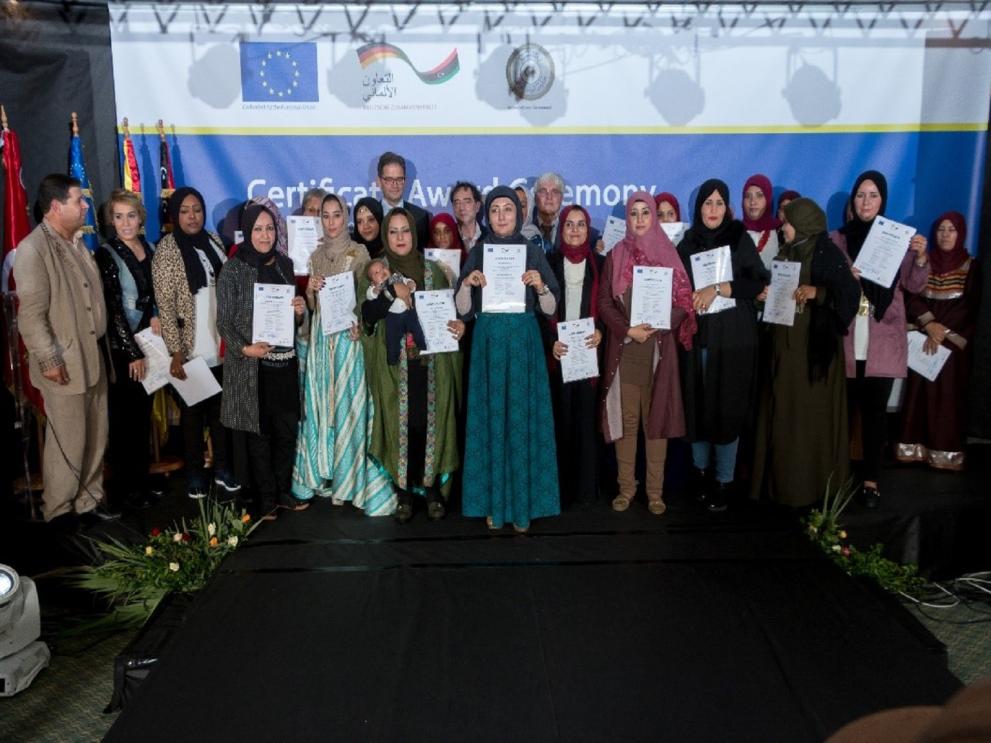
With support from the European Union (EU), 26 Libyan women become qualified trainers in Libya’s labour-intensive sewing and tailoring sector.
Monastir, 12 November 2018 –
Today’s award ceremony marks the completion of the training of 26 female trainers in sewing and tailoring, organized as part of the EU and German Government co-funded programme to support local municipalities in Libya.
In the presence of representatives from the German Embassy, the European Union, the Libyan Ministry of Local Government, the Libyan Embassy and the Gesellschaft für internationale Zusammenarbeit (GIZ), the women received their certificates for the completion of the training and the opportunity to present their works – upon their return, the awardees will train other women at the Women Training Development Centres in Libya that are set up, rehabilitated and equipped as part of this programme.
In the framework of the “Support to municipalities” programme, commissioned by the Federal Ministry for Economic Cooperation and Development (BMZ) and co-financed by the European Union, implemented by GIZ, selected Libyan communities along the migration routes, local governments are strengthened, public basic services improved and employment promoted. The programme supports 16 Libyan partner municipalities in ensuring better service provision at local level and increasing access for most vulnerable groups, including women and migrants.
Stefano Sotgia, the head of cooperation in the EU delegation to Libya, stated that “In addition to the goal of initiating economic development, employment and income generation in the communities, the establishment of Women's Centers is also empowering women to develop their projects and taking their full role in society".
The municipal councils are taking more and more charge of their own infrastructure and service delivery at the local level, part of which was the councils’ suggestion to establish the Women Training and Development Centres; this contributes to reconstructing a social and economic fabric that allows for job creation and economic recovery in Libya. Beyond the physical investment, these centres focus on capacity development to prepare women to become future trainers in different domains.
In 40 training days, within six months' time, 26 women from 10 different municipalities across Libya, have become qualified trainers in the sewing and tailoring sector. They will then train women in the development centres in their municipalities. The women acquired technical and pedagogical skills at the training centre of the SARTEX Company, a renowned export-oriented textile firm located in Tunisia’s “textile capital”, Ksar Hellal. Having learnt advanced sewing and tailoring skills, the women have produced trousers, shirts and jackets that meet industrial standards. They will now offer quality training at the women training centres in Libya and to operate them for the benefit of their community, particularly women. Ms Najet, a participant from the training states: “Being a trainer in the centre of my community allows me to earn additional income, but even more importantly, I want to teach girls to become economically independent.”
Kim Salmutter, GIZ Communication Officer: kim [dot] salmutter giz [dot] de (kim[dot]salmutter[at]giz[dot]de)
giz [dot] de (kim[dot]salmutter[at]giz[dot]de)
Ali El Asmar, EU Delegation Press Office: ali [dot] el-asmar eeas [dot] europa [dot] eu (ali[dot]el-asmar[at]eeas[dot]europa[dot]eu)
eeas [dot] europa [dot] eu (ali[dot]el-asmar[at]eeas[dot]europa[dot]eu)
Details
- Publication date
- 19 December 2018
- Region and Country
- Libya
- Thematic
- Improved migration management
- Partner
- GIZ
